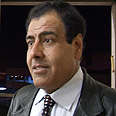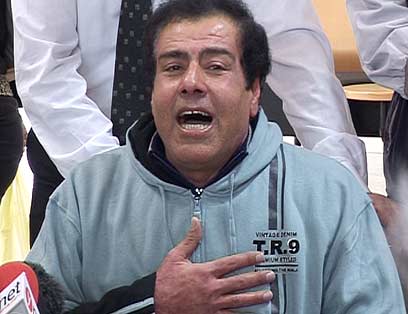
The tragic story of Izzeldin Abuelaish, a Palestinian doctor whose three daughters were killed during Operation Cast Lead in Gaza will be adapted as a play for Habima national theatre.
Dr. Abuelaish became a symbol in Israel when, during a live interview with Channel 10, his house was hit by two shells, killing three of his daughters and injuring the fourth.
Related stories:
- Gaza doctor loses 3 daughters
- Bereaved Gaza doctor to sue Israel
- Play focuses on Gaza doctor tragedy
Seeing as the Israeli public witnessed the horrifying incident live on TV, Abuelaish's story became a taunting and very vivid representation of the harsh conditions that Palestinian citizens had to endure during Operation Cast Lead.
The story of Abuelaish, a Harvard graduate gynecologist, who was the first Gazan doctor to receive a staff position in an Israeli hospital, was adapted to the stage by director Shay Pitovsky and dramaturg Shahar Pinkas.
The play is based on Abuelaish's 2011 autobiography "I Shall Not Hate: A Gaza Doctor's Journey on the Road to Peace and Human Dignity," published in Canada, where Abuelaish has been residing for the past few years.

Nominated for a Nobel Peace Prize. Abuelaish (Photo: Roi Gazit)
Directed by Pitovsky, the play will debut in September, and the role of Dr. Abuelaish will be played by Israeli Arab actor Gassan Abbas.
This is not the first time that Pitovsky chose to focus on sensitive national issues. In 2011, he directed a play that focused on the clash between Israeli citizens and immigrants and refugees. In the new play, he draws from his personal experiences in the army.
"During Operation Cast Lead, I was serving in a reserve unit that was stationed in a Palestinian house not far from Abuelaish's house," Pitovsky recounts. "It took me a while to come to terms with the whole experience. I joined the Combatants for Peace movement (Israelis and Palestinians promoting a non-violent struggle against the occupation), and started meeting Palestinians who have taken an active role as we have in the fighting. Working on this play is another stage in the process I have been going through."
In his adaptation, Pitovsky wanted to emphasize the human interest story and leave politics out. "It's not that the play completely disregards the political context, it's in the background, but I think that its strength lies in its emotional aspects. Israelis don't know what it means to grow up in a refugee camp, to struggle to survive, to struggle to make the place you live in a better place. Abuelaish was a kid in a refugee camp, and against all odds managed to pave his way to a Harvard degree."
"The play touches on the doctor's complex relationship with his parents, his struggle to survive, his triumph over an unperceivable reality and incomprehensible loss. His life shifts between dreaming big and failing big, and, a little like Oedipus, trying to fight fate. His choices raise a lot of questions.
"What made him stay in Gaza? How come he doesn't harbor any hate for Israel despite everything he's been through? There was a reason why this man was nominated for a Nobel peace prize."
In the height of Operation Cast Lead, when the IDF fired two shells into the window of Abuelaish's home, killing three of his daugters: 20-year-old Bessan, 15-year-old Mayar and 14-year-old Aya. His 17-year-old niece Nour was also killed in the attack, and his 18-year-old daughter Shada and other family members were injured.
Though not directly involved with the playwriting, Abuelaish talked to Abbas and read the play. For him, this is another way to commemorate the memory of his daughters.















